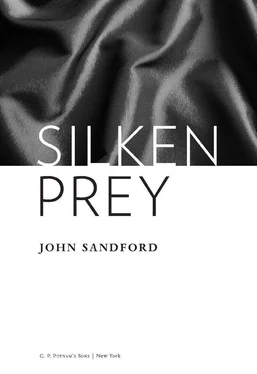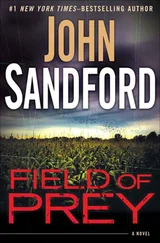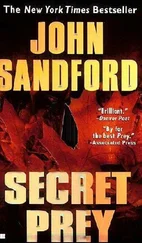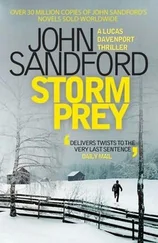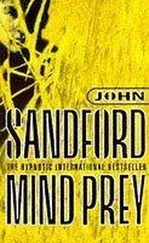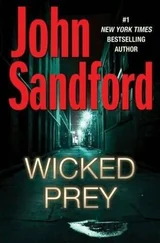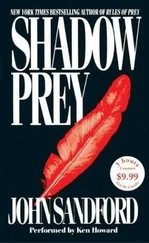She was wearing trim, soft black cotton slacks, a silky white blouse, a red nylon runner’s jacket with reflective strips front and back, and black running shoes. She had a thin black nylon ski mask in her pocket. The ski mask could be instantly buried; and no burglar in his or her right mind would be out with a red jacket, a shiny white blouse, and all those reflective strips.
Kidd started the SUV and they eased on down the hill toward Grant’s house. As they rolled along, Lauren turned the jacket inside out: the lining, now the outer shell, was jet black. She pulled it back on, and was now dressed head to toe in black. A hundred yards out, Lauren said, “I’ll call.” Kidd tapped the brakes—no red flash on the custom-switched brake lights—and when they were stopped, Lauren dropped out and quietly closed the car door.
Five seconds later, with the hood over her head, she vanished into the woods between Grant’s house and the neighbor’s.
• • •
THE GROUNDS WERE PROTECTED by both radar and infrared installations, but Kidd had switched off the alarms on the rear approach, and had fixed the software so that they couldn’t be turned back on without his permission. Lauren had one major worry: that the dogs would be turned loose. If that happened, she was in trouble. She had a can of bear spray, which should shut them down, but she had no idea how effective that would be.
For the time being, the dogs were in the house—one of them in the living room, where it could see the front hallway and the hall coming in from the garage; and the other outside the bedroom door.
Inside the tree line, she pulled a pair of starlight goggles over her head. They were military issue, and she’d had to pay nine thousand dollars for them six years before. With the goggles over her eyes, the world turned green and speckled: but she could see.
She began moving forward, like a still-hunter, placing each foot carefully, feeling for branches and twigs before she put weight down. Long pauses to listen. Fifty yards in, she crossed a nearly useless wrought iron fence. Any reasonably athletic human could slip right over it; Grant’s dogs could jump it with three feet to spare, and a deer would hardly notice it. Once over the fence, she took nearly fifteen minutes to cross the hundred yards to the edge of Grant’s back lawn. By that time, she knew she was alone. She took out her phone, a throwaway, and messaged Kidd, one word: “There.”
One word came back. “Go.”
Kidd was back on top of the hill, back on the manor’s Wi-Fi. Nothing inside the house had changed. Grant’s lawn was dotted with oak trees and shrubs, and Lauren stuck close to them as she closed in on the bedroom. There were motion and sonic alarms outside the bedroom windows, but Kidd had them handled. When she was below the windows, she took out a taped flashlight with a pinprick opening in the tape. She turned it on, and with the tiny speck of light, looked at the windows. Triple glazed, wired, with lever latches. Fully open, there’d be a space three feet long and a foot high that she’d have to get her body through. She could do that. . . .
She pulled back, listened, crept down the side of the house. A light came on in the living room and she froze. Nothing more happened and she felt her phone buzz. She risked a look: Grant moving. She listened, then began to back away from the house, heard a crunch when she stepped in some gravel, froze. Moved again ten seconds later, backing toward the woods.
From her new position, she could see the lighted living room, and Taryn Grant looking out the window. She was wearing a robe and had what looked like a drink in her hand. A dog moved by her hip, and Lauren thought, Bigger than a wolf.
The phone vibrated. She was into the tree line, and stopped to looked again: “Dogs may know . . . dogs may be coming.”
She thought, Damnit, and texted, “Come now,” and began moving more quickly. She crossed the fence, which should give her some protection from the dogs, and made the hundred yards out quickly, but not entirely silently. At the street-side tree line, she knelt, stripped the goggles and mask off, stuffed them in her pockets, and then Kidd was there in the car.
She was inside and pulled the door closed and they were rolling and Lauren looked out the window, toward Grant’s house, but saw no dogs. “She let them out?”
“I think so—into the backyard, anyway. Didn’t seem like there was any big rush. Maybe she was letting them out to pee.”
“That’s probably it,” Lauren said. “I never saw them. They didn’t bark.”
“They don’t bark, not those dogs,” Kidd said.
“I know.” She took a breath, squeezed Kidd’s thigh. “I haven’t felt like this in years. Six years.”
They came out of the darkened neighborhood to a bigger street, and Kidd went left. They could see a traffic light at the end of the street, where the bigger street intersected with an even bigger avenue.
Kidd asked, “What do you think?”
“Piece of cake,” Lauren said.
CHAPTER 20
The next step was not obvious. Lucas had Quintana’s belief that he’d spoken to Dannon on the phone, but that was not proof. Nor would it convince a jury to believe that a crime had been committed, not beyond a reasonable doubt. He needed a scrap of serious evidence, something that he could use as a crowbar to pry Grant, Dannon, and Carver apart.
He was also bothered by the sporadic thought: What if Tubbs showed up? In most killings, there was some physical indication that violence had been done. With Tubbs, there was nothing.
• • •
THE NEXT MORNING he did what he usually did when he was stuck, and needed to think about it: he went shopping. Nothing was so likely to clear the mind as spending money. He idled over to the Mall of America and poked around the Nordstrom store, looking for a good fall dog-walking jacket.
He didn’t have a dog, but a good dog-walking jacket was useful for a lot of other things. He had the exact specification: light, water-resistant, knit cuffs and waistband, modern high-tech insulation, warm enough for late fall and early winter days. And, of course, it had to look good.
He’d drifted from jackets to cashmere socks, especially a pair in an attractive dark raspberry color, when his phone rang: Cochran, from Minneapolis Homicide. Both Dannon and Carver had shown up to give DNA samples, and Lucas had sent the samples to Minneapolis.
“Turk, tell me we got them,” Lucas said.
“No, we don’t. We got James Clay,” Cochran said. “We got a cold hit from your DNA bank.”
James Clay? “Who the hell is James Clay?”
“Dickwad from Chicago. Small-time dealer,” Cochran said. “Moved up here five years ago when he got tired of the Chicago cops busting him for dope. We’ve been chasing him around for the same thing. We got him on felony possession of cocaine, got DNA on that case, he went away for a year. Since then, we’ve caught him holding twice, and both times, it was small amounts of marijuana, so he was cut loose.”
“Jesus Christ, that can’t be right,” Lucas said. “Roman wasn’t killed by any small-time dope dealer.”
“Sort of looks that way—of course, it’s possible he was paid to do it, though I doubt anyone would hire him,” Cochran said. “I’ll tell you, the dope guys say he’s exactly the kind of punk you’d want for a killing like this. He thinks the house is empty, goes in, she surprises him, he freaks out, whacks her with his gun, then shoots her, with some piece-of-crap .22.”
“Aw, man . . . Turk . . .”
Cochran said, “Listen, Lucas: he’s an old gang member, probably done two hundred nickel-dime burglaries, funding his habit, been shot at least once himself. He’ll steal anything that’s not nailed down. If all this election stuff hadn’t been going on, it’d be exactly who you’d have been looking for.”
Читать дальше
